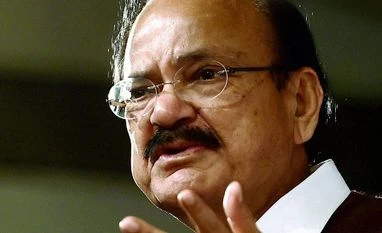For the I&B ministry, 2016 was a year in which it set the ball rolling for key policy changes - film certification process, a new Information and Communication policy - which it hopes will fructify this year.
Asked about his priorities for 2017, I&B Minister M Venkaiah Naidu said that bringing in a communication and information policy and working on the film certification bill would be his major priorities.
The ministry also brought in a new print media policy to increase transparency and accountability in release of government ads through DAVP.
The ministry witnessed a change at the helm in the mid year when Naidu took over from Finance Minister Arun Jaitley.
2016 began with Jaitley announcing the formation of a committee under ace director Shyam Benegal, to review the film certification process.
The committee submitted its report, favouring a system which would have more categories and less of censorship after which the ministry is working on a bill, which is likely to be placed before Parliament this year.
Like previous years, film certification was a contentious issue and there was a full blown controversy over cuts in the movie "Udta Punjab".
The ministry is also expected to hold consultations on the Information and Communication policy this year before it finalises a policy in this regard, an aspect which has found strong support from Naidu.
2016 also saw a massive debate on an aspect related to regulation of television media especially in the backdrop of an I&B ministry order to take off Hindi news channel NDTV India for a day over its coverage of the Pathankot terror attack.
The order was later put on hold as the channel sought the order be relooked at after representatives from the broadcaster met ministry functionaries.
During the year, the ministry also organised a state information ministers' conference after a gap of seven years. It also increased subsidy for setting up of community radio stations from 50 per cent to 90 per cent in the northeastern states and 75 per cent in other states, subject to a maximum limit of Rs 7.5 lakh.
It also worked on simplifying the annual renewal process for existing TV channels as part of 'Ease of Doing Business'.
A total of 170 channels were given licences from June 2014 till December 2016 and of these, with 25 of these being news channels and 145 licences non-news channels.
The process of second batch of FM radio channels under Phase III expansion was also completed and it is expected that the results would be announced in this year. The auctions for the second batch were held recently for 266 channels in 92 cities. The deadline for implementation of Phase IV was December, 2016 but it has been extended till March 31, 2017.
An exclusive service for Bangladeshi and Bengali diaspora was launched by All India Radio so was a Baluchi multimedia website and a mobile app for greater people-to-people contact.
A new Doordarshan channel for the northeast is also expected in the new year.
Asked about his priorities for 2017, I&B Minister M Venkaiah Naidu said that bringing in a communication and information policy and working on the film certification bill would be his major priorities.
The ministry also brought in a new print media policy to increase transparency and accountability in release of government ads through DAVP.
Also Read
2016 began with Jaitley announcing the formation of a committee under ace director Shyam Benegal, to review the film certification process.
The committee submitted its report, favouring a system which would have more categories and less of censorship after which the ministry is working on a bill, which is likely to be placed before Parliament this year.
Like previous years, film certification was a contentious issue and there was a full blown controversy over cuts in the movie "Udta Punjab".
The ministry is also expected to hold consultations on the Information and Communication policy this year before it finalises a policy in this regard, an aspect which has found strong support from Naidu.
2016 also saw a massive debate on an aspect related to regulation of television media especially in the backdrop of an I&B ministry order to take off Hindi news channel NDTV India for a day over its coverage of the Pathankot terror attack.
The order was later put on hold as the channel sought the order be relooked at after representatives from the broadcaster met ministry functionaries.
During the year, the ministry also organised a state information ministers' conference after a gap of seven years. It also increased subsidy for setting up of community radio stations from 50 per cent to 90 per cent in the northeastern states and 75 per cent in other states, subject to a maximum limit of Rs 7.5 lakh.
It also worked on simplifying the annual renewal process for existing TV channels as part of 'Ease of Doing Business'.
A total of 170 channels were given licences from June 2014 till December 2016 and of these, with 25 of these being news channels and 145 licences non-news channels.
The process of second batch of FM radio channels under Phase III expansion was also completed and it is expected that the results would be announced in this year. The auctions for the second batch were held recently for 266 channels in 92 cities. The deadline for implementation of Phase IV was December, 2016 but it has been extended till March 31, 2017.
An exclusive service for Bangladeshi and Bengali diaspora was launched by All India Radio so was a Baluchi multimedia website and a mobile app for greater people-to-people contact.
A new Doordarshan channel for the northeast is also expected in the new year.
)